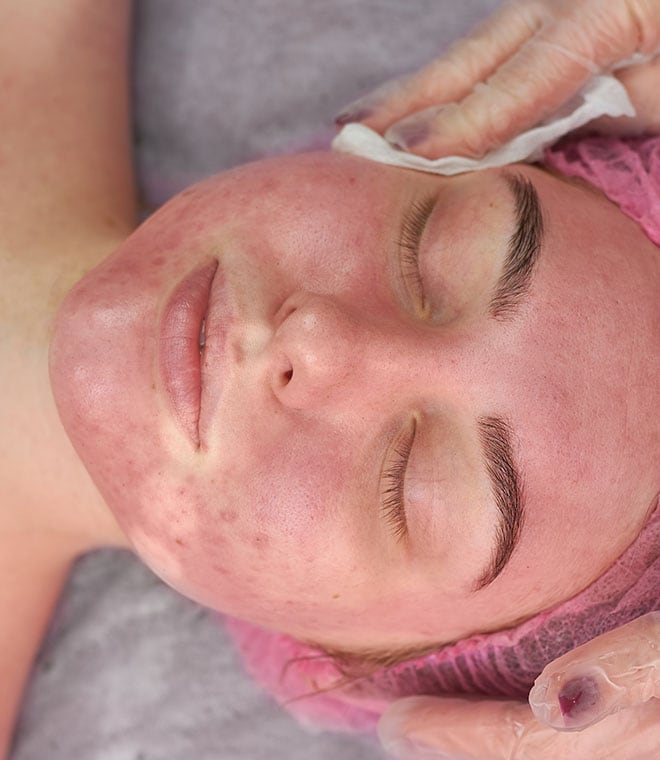Health
What is nodular acne?
By Dr. Anna H. Chacon, MD, Fellow of the American Academy of Dermatology Apr 03, 2024 • 5 min
Nodular acne is a type of acne that produces large, painful bumps deep within the skin. If you feel like you have hard pimples under the skin, you may have nodular acne. Due to the severity of this skin condition and the potential for scarring, it’s important to recognize the symptoms so that you can seek a proper diagnosis and treatment.
What is nodular acne?
Nodular acne is characterized by nodules and cysts. This type of acne typically occurs on the face, chest and back, although it can appear in other areas.
Sometimes, nodular acne occurs with cystic acne, forming a condition known as nodulocystic acne, which is usually deeper and more painful than regular comedonal acne (blackheads and whiteheads). Nodulocystic acne produces larger skin lesions that persist for weeks or months and are harder to treat. In some cases, nodulocystic lesions will become inflamed, appearing swollen and red, and they may ooze. They generally don’t form a head, and trying to squeeze them may worsen the condition. Residual scarring or dark spots may occur once the lesions heal.
Symptoms of nodular acne
Blemishes associated with nodular acne may occur individually or in clusters. These include:
- Papules, or small, hard red bumps
- Pustules, or small bumps on the skin that look similar to pimples but contain pus
- Nodules and cysts, which penetrate deep into the skin layers
Another variant of nodulocystic acne is acne conglobata, which is a rare but more severe form of nodular acne. It commonly appears as groups of whiteheads or blackheads, inflamed pink bumps or papules, or cystic nodules on the trunk, buttocks and limbs.
If nodular acne isn’t treated early, it may lead to painful, odorous bumps that can take months to heal and leave pitted or cord-like scarring.
Treatments for nodular acne
The earlier nodular acne is addressed by a dermatologist, the better the chances of quick healing with minimal scarring. Treatments for nodular acne include:
Isotretinoin: An oral retinoid used to treat a variety of skin conditions, isotretinoin is very effective at treating nodular acne. However, it is also associated with several serious side effects, and it comes with a high risk of birth defects if taken during pregnancy. Isotretinoin should only be used if other acne medications and treatments have been ineffective. Treatment with isotretinoin typically lasts about five months, although in severe cases, a second course may be needed. Patients who undergo this treatment must register with the U.S. Food and Drug Administration’s iPledge program, created to ensure close monitoring for potentially severe side effects.
Steroids: Intralesional steroids, which are injected into lesions or immediately below them, can help reduce inflammation and promote healing. Oral steroids may also be used to fight inflammation.
Oral antibiotics: In the event a secondary bacterial infection occurs with nodular acne, oral antibiotics may be prescribed to prevent serious complications and the intense scarring that can result.
Birth control pills: For women with nodular acne triggered by hormonal changes, birth control pills may be prescribed to help control oil production in the skin and prevent clogged pores.
Drainage: For large or persistent inflamed nodules, cysts or lesions, a doctor may make an incision and drain them to promote faster healing.
How to prevent nodular acne
A daily cleansing skin care routine is essential for helping to reduce the severity of nodular acne. Reducing your stress may also help, since stress produces hormones that may contribute to this condition.
Some people will develop nodular acne despite their best efforts. In this case, the best way to prevent nodular acne from becoming severe is to address it right away and start treatment, which improves the chances of healing and minimizes the risk of infection and scarring.
Nodular acne is a serious form of inflammatory acne that requires treatment by a professional. In order to effectively tackle the problem and prevent long-term scarring, see a dermatologist for a full evaluation and treatment plan.
Clinically reviewed and updated April 2024.
Sources:
- https://pubmed.ncbi.nlm.nih.gov/27816123/
- https://pubmed.ncbi.nlm.nih.gov/32358215/
- https://www.aad.org/public/diseases/acne/derm-treat/severe-acne
- https://www.aad.org/public/diseases/acne/diy/types-breakouts
- https://www.mayoclinic.org/drugs-supplements/isotretinoin-oral-route/description/drg-20068178#
- https://my.clevelandclinic.org/health/diseases/22888-nodular-acne
- https://pubmed.ncbi.nlm.nih.gov/29083736/#



